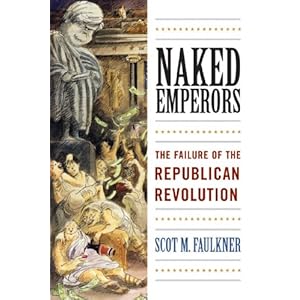How Newt Gingrich's GOP Rivals Blackmailed Him Back in the '90s
 The centerpiece of Newt Gingrich’s claim for the GOP nomination is that “we balanced the budget during the four years I was Speaker.” This is a true crowd pleaser in an era when both the White House and Congress have sailed America over a fiscal cliff.
The centerpiece of Newt Gingrich’s claim for the GOP nomination is that “we balanced the budget during the four years I was Speaker.” This is a true crowd pleaser in an era when both the White House and Congress have sailed America over a fiscal cliff.
The truth is very different from Gingrich’s account and accounting.
Fiscal Year 1995 began on October 1, 1994, prior to the Republican landside in November. Federal outlays were approximately $1.5 trillion against approximately $1.4 trillion in revenue, for a deficit of $164 billion.
Fiscal Year 1999 began on October 1, 1998, the last few months of Gingrich’s Speakership. Federal outlays were $1.7 trillion against $1.8 trillion in revenue. For more information, visit OMB’s historical tables.
Indeed, the 1999 budget was not only balanced but was running a positive balance of $125 billion. However, only Fiscal Years 1998 and 1999 were surplus or “balanced” budgets. Fiscal Years 1996 and 1997 still ran deficits. So, Gingrich can only claim two years of balanced budgets under his Speakership, not four.
Yes, Fiscal Years 2000 and 2001 were also balanced, but they were under a different Speaker while still under President Clinton.
Look closer—during Gingrich’s Speakership government spending went up 12.2 percent, as did revenue (taxes) by 35.2 percent.
What really happened? Is this worthy of being called a conservative/Republican fiscal nirvana?
Tax revenue soared because the economy was soaring. Starting in 1992, before either Clinton or Gingrich could lay claim to the American economy, the U.S. Gross National Product was growing at a healthy six percent. It maintained this healthy five to six percent growth rate through mid-2001, until the burst of the dotcom bubble and the tragic events of 9/11. At the same time, inflation stayed below three percent and was below two percent by mid-1997.
Other numbers provide further insight. Defense spending, a major issue during this primary season, actually went down during three of the four Gingrich years while discretionary domestic spending went up 10.3 percent. Will Republican crowds cheer those numbers?
What happened to Republicans cutting the federal budget? Two reasons: Bob Livingston and Newt Gingrich.
Rep. Bob Livingston was the Chairman of the House Appropriations Committee during Gingrich’s Speakership. He was the “conservative” alternative to four committee Republicans who had more seniority. However, Livingston was one of many Republicans who felt it was their turn to exploit power after forty years in the political wilderness. “Reform” and “revolution” were great soundbites, but they were not going to make them operational reality.
Under Livingston, the House Appropriations Committee maintained its reputation as the aloof and all powerful “College of Cardinals.” The spring of 1995 was spent doing business as usual, not laying the ground work for reversing the decades-long spending spree.
Why did Gingrich allow such a fundamental breech in his “revolution”? First, he was obsessed with making sure his “Contract with America” passed the full House by the Easter Recess. This was a bravura parliamentary performance and great PR, but it was an empty effort. Except for finally having Congress comply with the laws its passes, all other “Contract” legislation either died in the Senate or with President Clinton’s veto.
Gingrich did not have a “second act” after his first hundred days. No one had laid out a strategy for the long haul. With Gingrich and House leaders fixated on the one hundred day legislative marathon, Livingston was free to maintain the status quo. There was no preparation for the autumn 1995 budget battles. This is why the Republicans lost the government shutdown fight.
Republican “budget hawks” were silenced by the political blow-back over the mismanaged budget showdown. The siren call of earmarks beckoned. Republicans fell into their comfort zone of making local voters happy by “bringing home the bacon” with thousands of special taxpayer-funded projects. The window for revolution closed.
There was another reason for Gingrich having a “brain freeze” over government spending— Callista Bisek. In 1993, Gingrich began a secret affair with this committee staffer, who was twenty-three years his junior.
Gingrich’s dalliance would have remained a private footnote except for two things: he continued the affair after he became Speaker, and Livingston and moderate Republicans found out about it.
As chronicled in my book Naked Emperors: the Failure of the Republican Revolution, Gingrich was, in essence, politically “blackmailed” by Republican moderates to pull back on his revolution.
Gingrich had a choice—remain faithful to his wife and his cause, or toss both over for Callista. He chose Callista.
Gingrich turned on his own revolution and ultimately his revolutionaries turned on him. There was the failed coup against Gingrich in July 1997 and the GOP abandoned him in the wake of ethics charges in the fall of 1998.
Gingrich ended his Speakership and his tenure in Congress known as the “father who killed his own child.” He spent fourteen years laying the groundwork for the historic Republican Revolution only to undermine it with his personal urges. This is the genesis of Gingrich being called undisciplined and immature on the campaign trail, and why most of those who worked closely with him are opposing his candidacy.
Related Links
Former Gingrich Ally Claims Republican Leaders Blackmailed Him Over Affair
